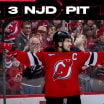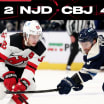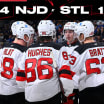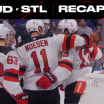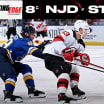The scene was different in The Meadowlands.
For the Devils, it had a pure, Montana-Big Sky feel about it even though there were factories and chemical plants nearby.
Coming home to New Jersey for Game 3 felt like a tonic. The bromide, "Home, sweet, home" had more than idle meaning.
"What mattered," said Martin Brodeur, "was that we were back to our place and it gave us a comfortable feeling."
SUNDAY WITH STAN: The Ultra Suspenseful Game 3
It would take more than 80 minutes decide Game 3 between the Devils and Rangers
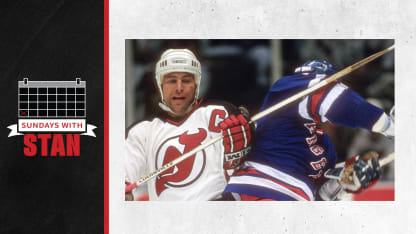
By
Stan Fischler
Special to NHL.com
sundays with stan
DEVILS-RANGERS, 1994 EASTERN FINAL
Part: 3: Can the Devils do it again in Game 2?
Part 2: Devils upset Rangers in Game 1
Part 1: Prelude to the Historic Series
Nobody had to tell Marty - or any other Devil for that matter - that they would sell out the next two games, plus there would be a bloc of Rangers fans in the big barn.
"Didn't matter," added Bobby Holik."We were used to that. The deal now was for us to take the lead again and forget about what happened at The Garden in the last game."
Fair enough, but the Rangers weren't about to suffer amnesia over that. The Blueshirts had decisively tied the series and accentuated the point that they - not New Jersey - owned the NHL's best record.
The date for Game 3 was May 19, 1994 and, quite frankly, none of the veteran journalists who'd been covering the tournament had a clue which way it would go.
"I liked our chances on home ice," added Devils young blueliner Scott Niedermayer. "This was our chance to move ahead again."
For many pundits, the Devils best opportunity to succeed was rooted not so much in their tight camaraderie nor Brodeur's goaltending, it came down to the pair of sage coaches, Jacques Lemaire and Larry Robinson.
Collectively, they were cool, calm and collected. Each had won multiple Stanley Cups as stars with the Montreal Canadiens. Their experience and savvy give the underdogs a surplus of confidence.
Everyone was eagerly anticipating the series' resumption including one journalist who was chronicling it for his book.
"Game Three was a spectacle," wrote Tim Sullivan in his historic account of the series, Battle of the Hudson.
The melodrama had a three-ring circus feel to it; too much to fit on a marquee.
There was the Rangers star power, exemplified by captain Mark Messier; there was Mike Keenan, the tough-minded "Captain Bligh" behind the Visitors bench; and the imperturbable Mike Richter in goal.
The puck was dropped and, immediately, the Visitors took command.
What home ice "advantage" the crowd afforded the Devils was negated quicker than Lemaire could arrange his strategy. Messier started the play before the period was three minutes old.
His longtime buddy from Edmonton, Adam Graves, finished it, beating Brodeur at 2:43. Not surprisingly the blue-shirted fans in attendance went nuts.
"That wasn't part of our blueprint," said New Jersey's own Jim Dowd, "but it was only the first period; and early at that. We felt that there was a lot of hockey for us to play."
Actually, in little more than three minutes the home crowd was able to sing its first aria. The Devils had come to life; and in a rather unorthodox way.
It has been a fact of hockey life that since the puck was invented that some players score a lot and some - usually stay-at-home-defensemen - hardly ever score at all.
The Devils Russian veteran, Slava Fetisov, was in the latter fraternity.
Sure enough, with the large hulk of Mike Peluso semi-screening Richter, Fetisov fired the rubber goalward and, like a pinball, it detoured to Peluso and then caromed off the Rangers' Craig MacTavish's skate, past Richter.
It was a 1-1 ball game at the end of one, but that didn't tell half the story. For one thing, New Jersey's crack defensive center Bob Carpenter was wounded after being torpedoed by a hefty Jeff Beukaboom check.
The Devils' Bernie Nicholls sought reparations in the form of a crosscheck against Alexei Kovalev's throat. Remarkably, Bernie got away without being penalized.
But there was no "Get Out of Jail Free" pass for New Jersey's skaters in the second period. Bill Guerin's lumberjacking Rangers defenseman Kevin Lowe was caught and Billy G was whistled off for two.
Not good.
Out came the New York power players and in went the Rangers go-ahead goal. From Brian Leetch to Steve Larmer, to the netting - 2-1, Rangers.
No question, the score was being kind to the Devils. The Locals were being outplayed and outshot by a ton. Only Brodeur's imitation of Horatio at the Bridge kept his team close.
"There are times," said Mister Devil, Ken Daneyko, "when you want your goalie to steal a game. Marty got very good at that."
Whereas other puck-stoppers would be close to a nervous breakdown during assaults such as the Rangers were delivering, Brodeur treated them like schoolyard fun. It was part of his fabric.
Devils forward Tom Chorske was one of the Garden Staters who had been around long enough to know that the shot total, 31-13, should have guaranteed a New York victory.
"Marty kept us in," Chorske recalled, "and now we were looking for that one break to tie the score."
In the second period, the Devils answer to Leetch was a learned, long-time Jersey defender, Bruce Driver. Often overlooked but rarely overstated, Driver formulated the tying goal by corralling the puck at the right point.
His sizzling shot was accurate but stopped by Richter. However, Mike was unable to defuse the rebound which went directly to Valeri Zelepukin, a diffident but reliable forward. His wrist shot tied the game at 2-2.
Brodeur's dauntless play had braked the Rangers offense and the teams moved into the third period for what now looked like a chess game on ice. Keenan stayed with three lines while Lemaire rotated all four.
The third period ended without a decision and if there was any solace for the home crowd it was the fact that New Jersey had braked the Rangers blitz despite the rink sometimes appearing to be tilted against the Devils.
If this was a baseball game, it would have been termed "a pitcher's battle." On the ice it was Richter vs. Brodeur; a pair of likable, competent and cool cats.
Richter: "By this time in his young career, Marty had shown he could handle pressure and some of the toughest shots. We had big guns but for three periods, most of them were muzzled."
The first overtime revealed tight defensive play on both sides but, at some point, the shadowboxing had to end. It didn't after 20 minutes of sudden-death overtime, so it was time for another extra period.
"I thought for a second we had a win coming up," remembered Devils sniper John MacLean.
Into the second overtime the Devils manufactured a two-on-one break with Claude Lemieux feeding defenseman Tommy Albelin but Richter got his leg pad in the way.
Now it was the Rangers turn to execute a full-ice press.
For a good chunk of time the New Yorkers seemed to have the puck attached to an invisible string. Eventually, it would fall to a line comprised of Alexei Kovalev, Glenn Anderson and Stephane Matteau.
The decisive assault against Brodeur was underway.
A Kovalev thrust was stopped by Marty but, again, the rebound left his reach and a mad, chaotic scramble ensued. The man kissed by Lady Luck was Matteau who found the stray biscuit.
With one flick of his backhand, the puck helicoptered behind Brodeur. Game over!
The time was 6:13 of the second extra session. The scorekeeper recorded that Matteau's winner was taken on the Rangers 50th shot of the night.
As Tim Sullivan noted in "Battle of the Hudson," a security guard outside the Devils' clubhouse was ultra-prescient after the game when he tapped Captain Scott Stevens and warmly said the encouraging words:
"It's far from over boys - don't worry."
Alas, the defeated Devils were only momentarily dejected but eternally determined.
And they'd prove that point beyond a shadow of a doubt in the upcoming games!




